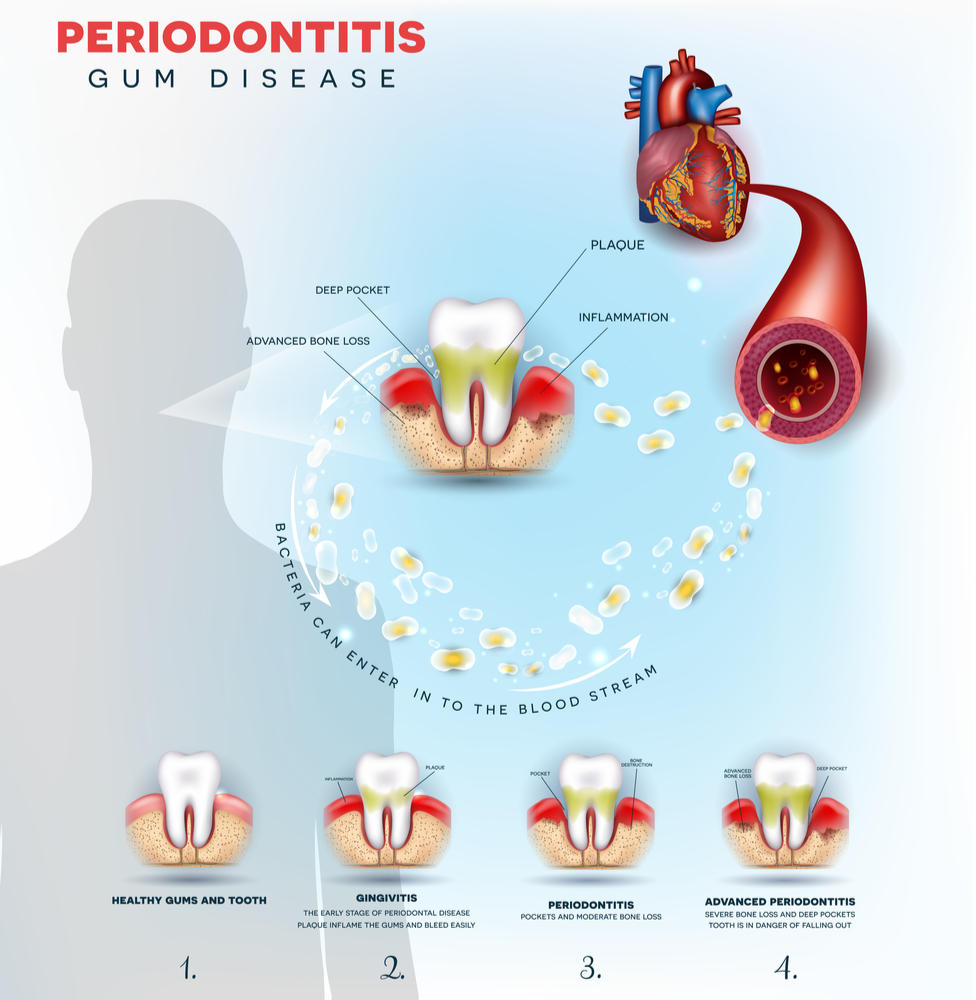Gum Disease is a bacterial infection in, you guessed it, the gums. Without practicing proper dental care, it can affect anyone regardless of how healthy they are. You may think it’s just a simple infection of the tissues that support teeth, and that it’ll go away eventually. The reality is that gum disease won’t go away without any treatment or preventative measures, and will even get worse.
Numerous studies have shown that untreated gum disease is linked to a variety of other health issues. Gum disease has been proved to increase the risks of many other health conditions, particularly cardiovascular issues. Considering that almost 50% of the American population has some stage of gum disease, and if you’re 65 or older this can increase to 70% according to the Centers for Disease Control and Prevention. Needless to say, gum disease is a widespread issue.
Gum Disease Increases Increases Risk Of Cardiovascular Problems
Gum disease does not stop at infecting the tissues in your mouth, which is a problem many people don’t realize. If you told someone that gum disease and overall poor dental health can lead to a massively increased risk of heart disease, they may not believe you at face value. But the unfortunate truth is that gum disease does in fact increase these risks.
Broken down into basics, gum disease causes inflammation due to the bacterial infection. Inflammation is arguably one of the biggest health issues for people and it’s caused by many things, gum disease included, and can worsen other health issues. Gum disease has been shown to potentially increase the risk of heart attacks, heart disease, strokes, and even control over diabetes.

Can An Infection From Gum Disease Spread To The Heart?
Gum disease won’t always stay strictly in the mouth. Near the root of your teeth are capillaries which help to transport blood through the bloodstream. When you have gum disease, especially more severe gum disease, it’s possible for the bacteria to end up in your bloodstream. This, in turn, can take that bacteria just about anywhere in your body.
If the bacteria is able to enter your bloodstream and spread to the heart. It can be hard to really believe, at first, that something as preventable as gum disease can spread the infection to the heart. It is, unfortunately, very possible.
When any bacterial infection, particularly from gum disease, spreads to the heart it can cause endocarditis. Endocarditis is a life-threatening inflammatory condition in the inner lining of your heart. This disease can usually be cured with antibiotics, but severe cases can result in the need for surgery. Even after overcoming endocarditis, there can still be long term effects.
How To Prevent Cardiovascular Issues From Gum Disease
There is some good news: it’s extremely easy to lower your risk of cardiovascular complications caused by gum disease. The first step is properly brushing your teeth at home at least twice per day, preferably with a fluoride toothpaste. When you brush your teeth, you should do so for a full 2 minutes while ensuring each area gets an equal amount of brushing.
The other common way to prevent gum disease is by making sure to clean the harder to reach places. This usually includes between your teeth where flossing is the most effective method. Also don’t forget to make sure your tongue is clean, as bacteria can settle there as well. A good mouthwash is a good addition to your routine, but does not replace the need for actual brushing and flossing.
Lastly, and most importantly, one of the best methods of preventing gum disease is by having regular dental cleanings from your local dentist. Pickett Family Dental of Keller, Texas, is the #1 choice for dental care. We provide our patients with the best dental care in a comfortable environment. Don’t let your gum disease get out of control and schedule an appointment today.



